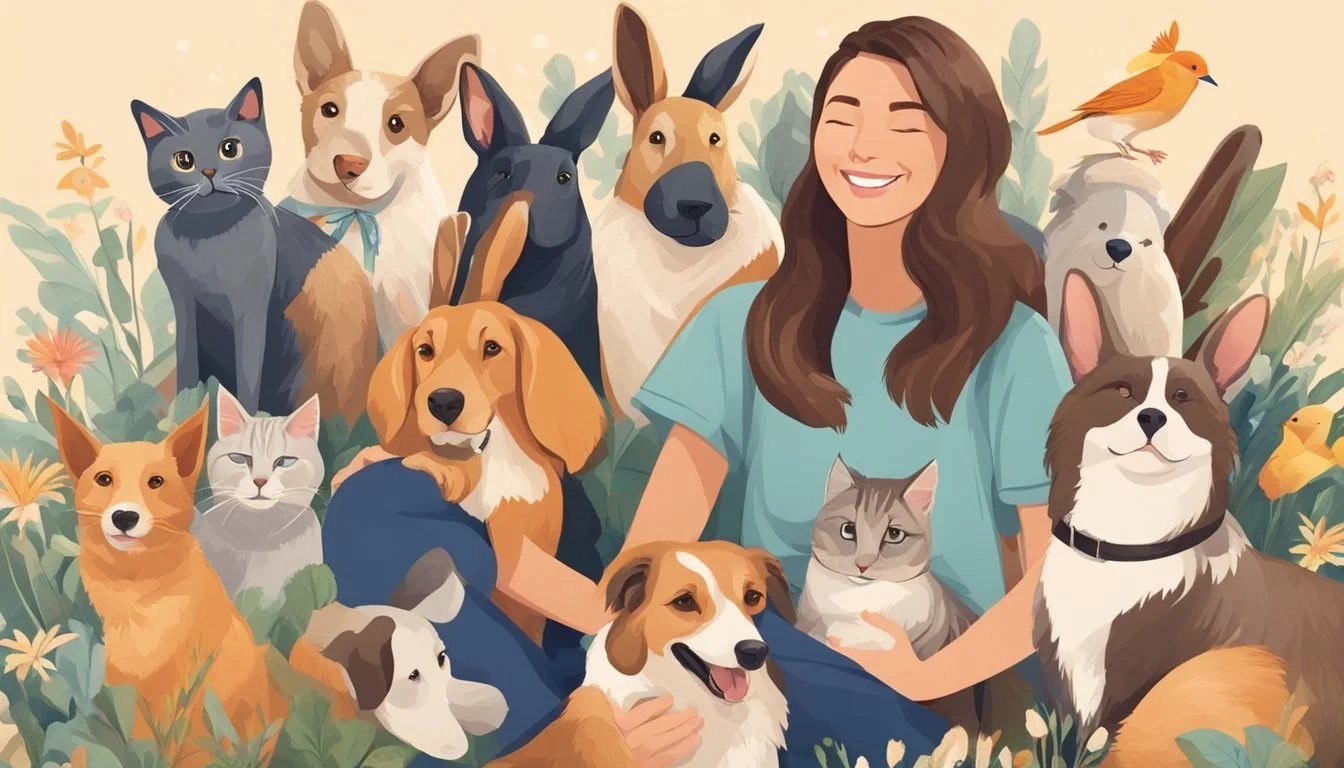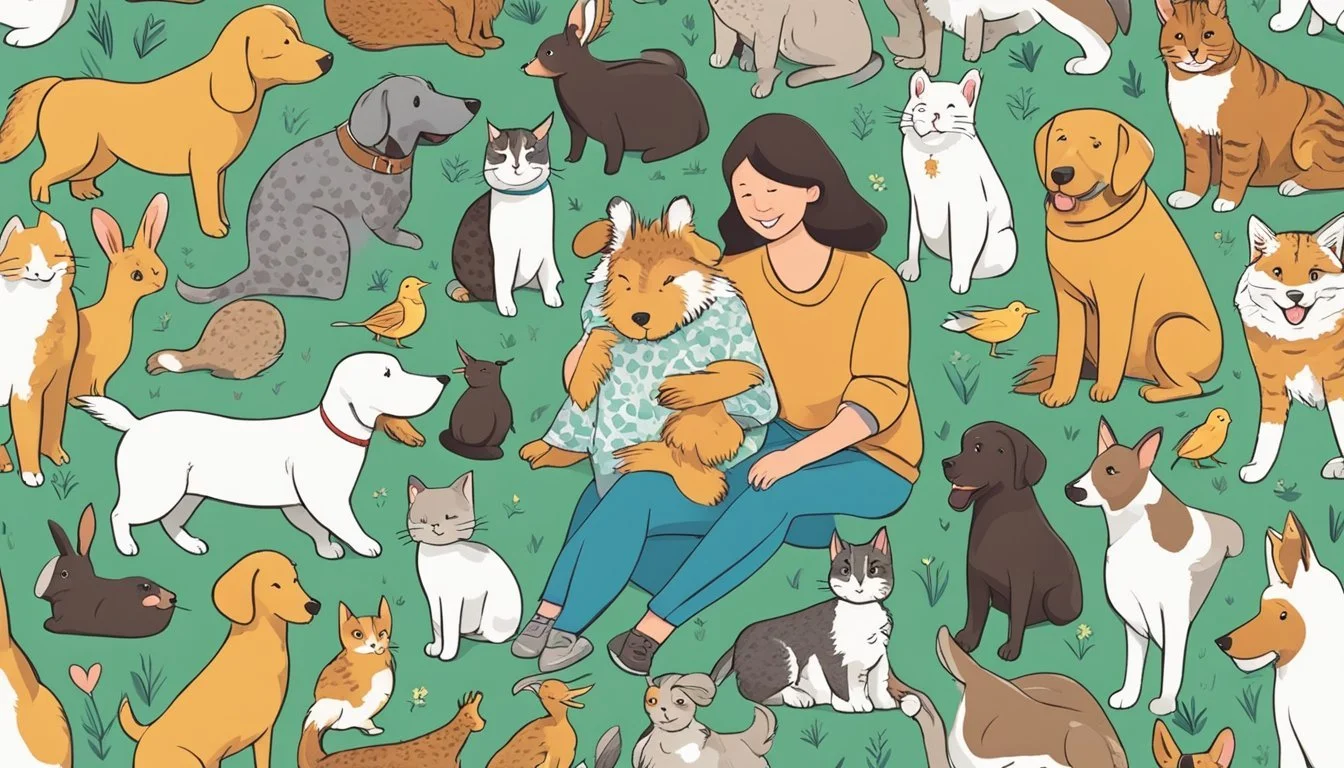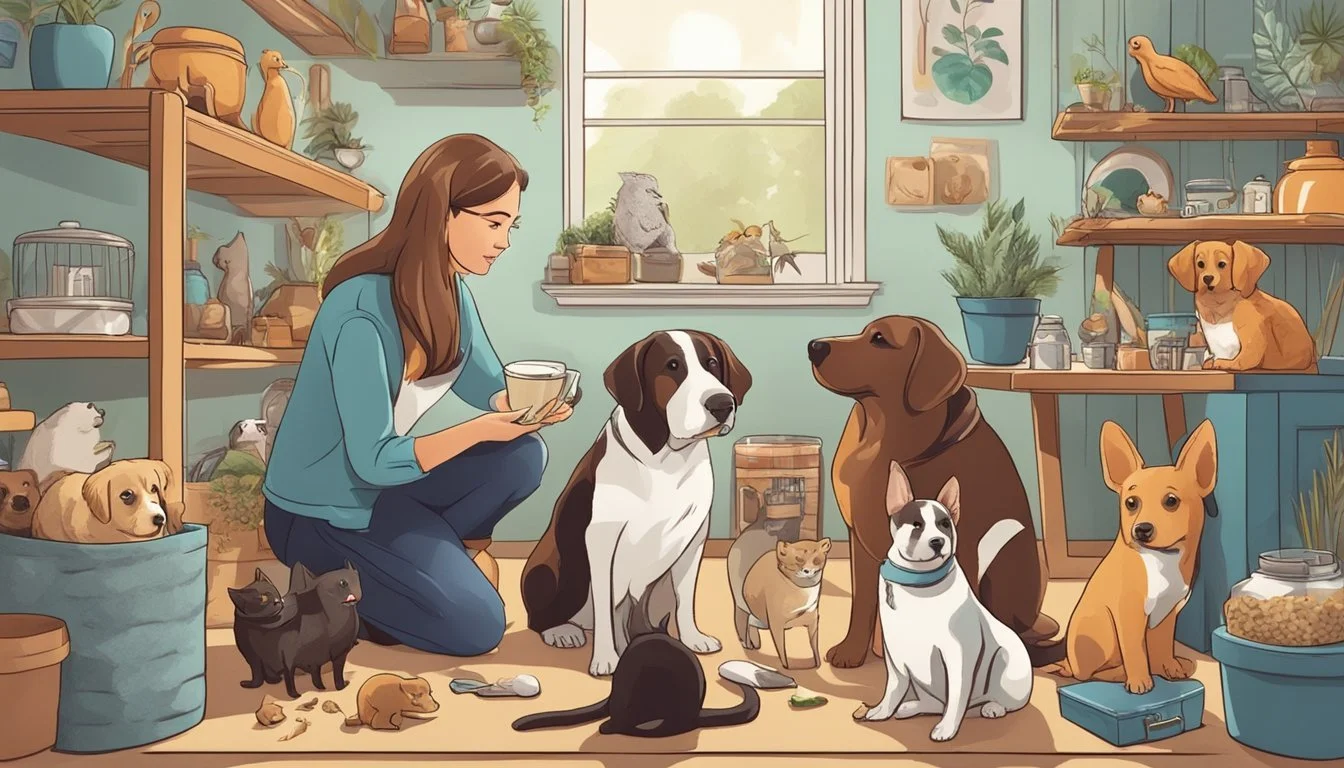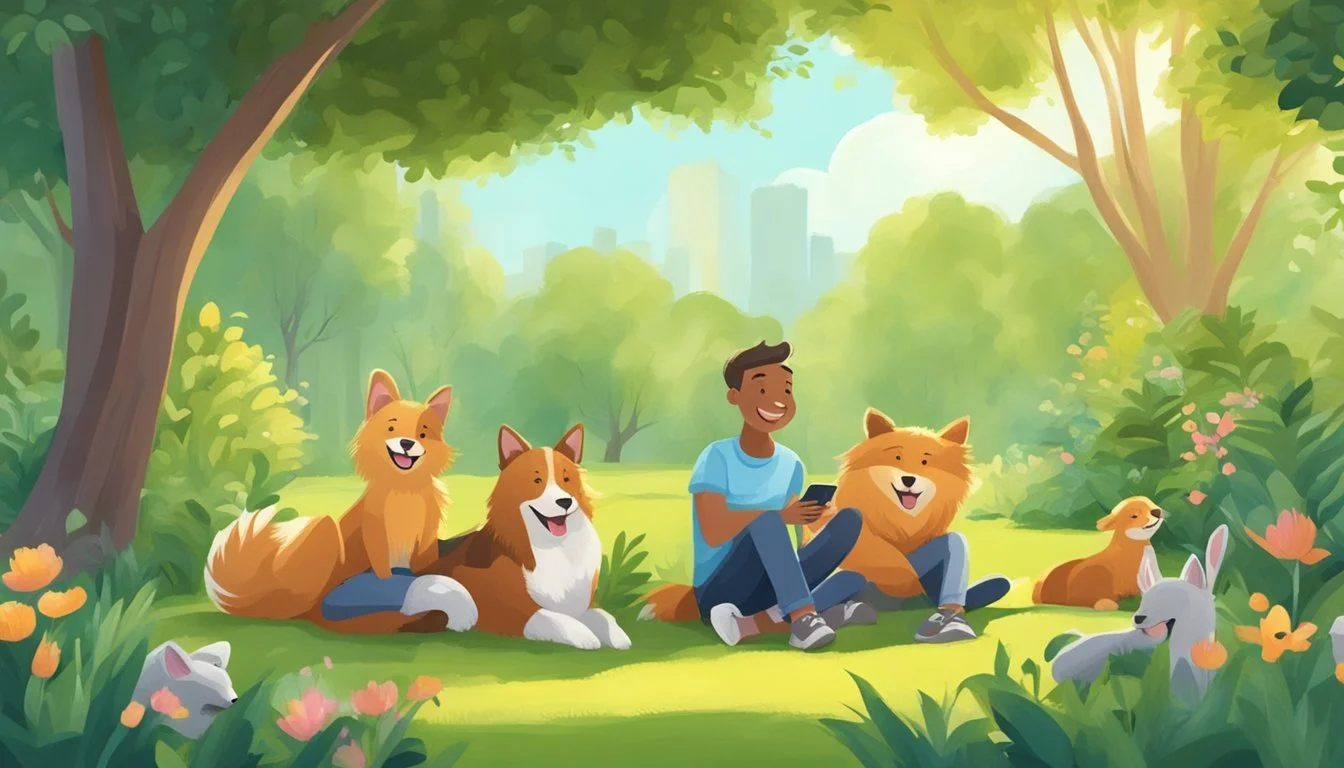13 Reasons Why Having a Friend Who Loves Animals is a Blessing
Enhancing Life with Compassion and Joy
Having a friend who loves animals can bring immense joy and companionship into one's life. These individuals often possess a special bond with creatures, reflecting qualities of empathy, patience, and kindness. The presence of such friends can profoundly enrich social interactions and bring a deeper appreciation for the natural world.
There has been a growing trend in recognizing the mutual benefits that humans and animals bring to each other. This reciprocal relationship is evident in various cultural rituals, such as the blessing of animals, which highlights the spiritual and emotional connections people form with their pets.
1) They understand animal behavior
People who love animals often have a deep understanding of animal behavior. This knowledge allows them to be more attuned to the needs and emotions of animals. They know how to read subtle cues that indicate how an animal is feeling.
Their empathy and sensitivity towards animals help them create a safe and comfortable environment. They can quickly identify when an animal is stressed, scared, or happy, and respond appropriately. This ability often stems from their continuous observation and interactions with various animals.
Animal lovers are also aware of the specific needs of different species. For example, they understand that dogs need plenty of physical activity and social interaction, while cats might require quieter and more solitary spaces. This keen awareness ensures the well-being of their pets.
They also recognize the importance of fostering social bonds among animals. Many people who love animals enjoy observing and encouraging positive interactions between their pets. These interactions can sometimes mirror human relationships, involving care and grooming behaviors that help to strengthen bonds.
With their extensive knowledge and compassion, animal lovers are highly capable of ensuring that animals in their care lead happy and healthy lives. This understanding of animal behavior not only benefits the animals but also enriches the lives of those who love and care for them.
2) Can Help Choose the Perfect Pet
A friend who loves animals often has substantial knowledge about different species and their needs. They can help assess what type of pet might suit a person's lifestyle, home environment, and personal preferences.
For example, they might suggest a cat for someone with limited space, as cats don't take up much room and tend to be more independent (Catster).
They may also have insights into the temperament and care requirements of various breeds. This can prevent mismatches between pet and owner, ensuring a happy and harmonious relationship.
Furthermore, animal-loving friends often stay updated on reputable breeders, shelters, and adoption events. They can guide others towards ethical sources for acquiring a pet. This knowledge minimizes the risk of supporting unethical breeding practices.
They can even accompany someone to visit potential pets, offering valuable feedback and advice. Their experience can be crucial in recognizing signs of health or behavioral issues that a less experienced person might miss.
Having a friend who loves animals means having a trusted advisor in the pet selection process, ensuring a well-considered and loving decision.
3) They are compassionate
Animal lovers often exhibit a high level of compassion. They feel a deep connection and empathy towards animals, recognizing their feelings and needs. This empathy extends beyond animals and influences their interactions with people as well.
Their compassion often drives them to take action. Whether it's volunteering at shelters or advocating for animal rights, they consistently demonstrate care and kindness. This dedication to helping those in need fosters positive relationships with others as well.
Compassionate individuals who love animals tend to provide emotional support both to their pets and human friends. Their nurturing nature makes them great listeners and caregivers, always ready to offer a comforting presence.
Having a friend who shows such genuine concern for living beings can be incredibly heartwarming. It creates a supportive environment where empathy and understanding flourish. Their compassion not only enriches their lives but also profoundly impacts those around them.
4) Offer Pet Care Advice
Friends who love animals often have a wealth of knowledge about pet care. They can recommend the best foods and treats for different pets, ensuring nutritional needs are met. This kind of advice can help pet owners make informed decisions about what to feed their furry friends.
They are typically well-versed in recognizing early signs of illness in pets. By being able to spot these signs, they can help in seeking timely veterinary care, which is crucial for a pet's health. This expertise can significantly contribute to the wellbeing of pets.
Those who have spent considerable time with various pets often have tested and trusted grooming tips. They can suggest effective grooming routines and products that keep pets clean and healthy. Having access to this kind of practical knowledge can make pet care much more manageable.
They can also provide insights into pet behavior, helping owners understand why their pets act a certain way. Knowing this can reduce misunderstandings between pets and their human companions, fostering a better relationship. This kind of behavioral advice is invaluable for maintaining harmony in a household with pets.
5) Can Recommend a Good Vet
One of the significant benefits of having a friend who loves animals is their ability to recommend a good vet.
Because they are well-connected in the pet community, they likely know veterinarians who provide excellent care.
They base their recommendations on personal experience, ensuring that the vet is trustworthy and capable.
Additionally, they are often aware of which vets specialize in certain animals or conditions.
This knowledge can save a lot of time and stress when seeking medical attention for a pet.
Reliable vet recommendations mean pets receive high-quality care, leading to better health and wellbeing.
Animal lovers are also likely to know about emergency vet services in the area.
Their insights can be invaluable during urgent situations where every moment counts.
To enhance the credibility of their recommendations, animal lovers often stay updated on reviews and feedback about local vets.
This habit ensures they provide the best possible information, making pet care more effective and straightforward.
Connecting with a knowledgeable friend who loves animals can thus be a great resource for pet owners.
6) Always Willing to Pet-Sit
Having a friend who loves animals often means they are delighted to pet-sit.
Their enthusiasm for animals ensures that your pets are in good hands. This can be particularly comforting during vacations or business trips, knowing your furry friends are receiving ample care and attention.
They are also knowledgeable about pet behavior and needs. Whether it's feeding schedules or administering medications, they are well-equipped to handle these tasks efficiently.
Your pets benefit from the extra affection and playtime. Friends who love animals tend to go above and beyond, making sure your pets feel loved and entertained.
Having an animal-loving friend nearby can save you money on professional pet-sitting services. This practical advantage often translates to peace of mind as well.
For those with pets requiring special care, such friends are usually more patient and understanding. Their experience and compassion make them ideal caretakers in such situations.
7) Introduce you to pet-friendly spots
A friend who loves animals often knows the best pet-friendly spots. They can point out local parks where dogs can roam freely and socialize. These parks often have amenities like doggy water fountains and waste disposal stations, making outings easier and more enjoyable.
They are also familiar with pet-friendly cafes and restaurants. Many places now welcome pets, offering special menus and treats for four-legged companions. This makes it easier to enjoy a meal or coffee without leaving pets behind.
Pet-friendly beaches are another great spot they know about. These areas are designated for pets to run, swim, and play. Knowing the best times to visit can help avoid crowds and ensure a relaxed experience.
Your animal-loving friend can also recommend hiking trails that welcome pets. These trails often have varying levels of difficulty, ensuring pets get exercise suited to their needs. This can turn a simple hike into a fun adventure for you and your furry friend.
They keep updated on local regulations regarding pets. Knowing which places require leashes or have specific rules helps avoid fines and ensures a smooth outing. It's this level of preparedness that makes outings seamless and stress-free.
8) Provide Fun Animal Facts
Having a friend who loves animals means you can always enjoy fascinating and fun animal trivia. Did you know that cows have best friends and can form strong bonds with them?
Koalas have fingerprints so similar to humans that they can be confused at a crime scene. Giraffes may look very different, but they share the same number of neck vertebrae as humans.
Cichlid fish parents are very attentive. They spend all their time fanning the larvae and protecting them from predators once the eggs hatch. If any larvae wander off, the parents suck them into their mouths and bring them back to safety.
Additionally, some unusual animal friendships can be quite touching. For example, there’s a story about a wild cat and a fox in Turkey that have formed an unlikely yet heartwarming bond. Such friendships challenge the conventional understanding of animal behavior.
These fun facts make conversations lively and interesting, providing unique insights into the animal kingdom. Definitions and generalizations often fall short of capturing the curious and diverse behaviors of animals, which makes these tidbits all the more intriguing.
9) Organize Pet Playdates
Organizing pet playdates can be a wonderful way to foster socialization for your pets. Regular interactions with other animals help your pets build confidence and improve their behavior. This is particularly beneficial in controlled environments where their comfort and safety are prioritized.
When planning a pet playdate, select playmates that match your pet's temperament and play style. This helps to ensure that the playdate is enjoyable for all animals involved and reduces the likelihood of conflicts.
Supervision during the playdate is crucial. Owners should monitor the animals' interactions to ensure they are playing safely and not exhibiting aggressive behavior. Choosing an appropriate environment, such as a safe backyard or a designated pet park, also contributes to a positive experience.
For more detailed guidance on setting up playdates, consider organizing pet playdates, which offers insights on creating a safe and enjoyable environment.
10) Have animal welfare knowledge
A friend who loves animals often has a strong understanding of animal welfare. They know how to ensure that animals live in healthy and humane conditions.
They can share insights on caring for pets and how to improve the lives of animals in shelters. Having this knowledge means they can guide others on ethical treatment practices.
They might also provide information about the history and importance of the animal welfare movement. This information can include how the movement started and how it has evolved over the years.
Knowing about legislation and regulations related to animal welfare can also be useful. This can help ensure that animals in captivity or under human control are treated with respect and kindness.
Their knowledge helps raise awareness about various animal welfare issues and what steps can be taken to address them. This contributes to a more compassionate and informed community, benefiting both animals and humans.
11) Inspire adoption over buying
Friends who love animals often educate others about the benefits of adopting pets from shelters. By adopting, individuals help reduce pet overpopulation and discourage unethical breeding practices.
When someone adopts, they are providing a home for an animal that may have otherwise faced euthanasia. These friends share the joy of giving a second chance to a deserving animal.
Adoption is also cost-effective. Shelters usually charge much less than breeders, often including health checks and vaccinations in their fees. This economic incentive makes adoption a more appealing option for many people.
Additionally, these friends highlight the emotional rewards of adopting. The bond between an adopted pet and its owner is often very strong, fostering a sense of fulfillment and purpose.
By actively promoting adoption, they support local shelters and animal rescue organizations. This encourages communities to participate in compassionate practices and helps sustain the efforts of those who work tirelessly to care for homeless animals.
12) Actively support shelters
Friends who love animals often take active roles in supporting local shelters. They understand the importance of community involvement in saving pets' lives. By volunteering their time, they help shelters operate smoothly and ensure animals receive the care they need. They may also participate in fostering programs, providing temporary homes for animals.
Engaging with shelters can include organizing fundraising events. This helps shelters with the financial resources needed for food, medical care, and other essentials. Donations, whether monetary or in-kind, make a significant impact, ensuring that shelters can continue their work.
Education is another way animal-loving friends contribute. They often share information about the benefits of adopting pets from shelters. They can highlight success stories, like those from organizations such as Best Friends Animal Society, encouraging others to adopt.
These friends may also support policy changes that benefit animals. By working with groups like the Humane Society of the United States, they help advocate for better laws protecting animal welfare. This advocacy is crucial for creating lasting change in how animals are treated.
Shelters often need supplies such as blankets, toys, and food. Friends who love animals frequently organize drives to collect these items. By actively supporting shelters, they play a pivotal role in improving the lives of countless animals.
13) Encourage responsible pet ownership
Having a friend who loves animals can inspire responsible pet ownership. They understand the commitment that comes with caring for a pet. From proper nutrition to regular veterinary checkups, they know the importance of maintaining their pet’s health.
Behavioral training is another key aspect. They invest time in teaching their pets commands like "sit", "stay", and "come." This not only improves the pet’s quality of life but also strengthens their bond.
They are also aware of the need for proper socialization. Introducing pets to different environments and people helps in developing their confidence and reduces anxiety.
Additionally, they recognize the significance of providing mental stimulation. Toys, games, and activities keep pets engaged and prevent boredom.
Their approach often includes educating others. By sharing tips and resources on responsible pet care, they create a community of informed pet owners.
For more in-depth information, organizations like FOUR PAWS and PAWSLA offer excellent guides on the subject.
Emotional Support Through Tough Times
Having a friend who loves animals can be a profound source of comfort and resilience during challenging periods. Their empathy and companionship bring unique emotional support.
The Comfort of Understanding
Friends who love animals often exhibit a heightened sense of empathy. This empathy extends to their human relationships.
They tend to be patient listeners and provide a comforting presence. Pets in their lives have likely taught them patience and unconditional love, making them reliable sources of support when friends feel isolated or anxious.
Their non-judgmental approach helps in fostering an environment where emotions can be openly expressed.
This emotional intelligence, developed through their interactions with pets, translates into an understanding that helps soothe their friends in times of crisis.
Building Resilience Together
Animal-loving friends often exhibit practical approaches to building resilience. They recognize the importance of companionship and mutual support.
Activities such as taking a walk with a pet or simply sharing time with them can be therapeutic. These friends encourage such activities, promoting mental well-being.
The regular routine of caring for animals instills discipline and creates a sense of responsibility. Sharing these routines with friends can build a support system where both parties grow stronger together.
Their perspective on life, enriched by their bond with animals, often includes a more optimistic and resilient outlook.
Shared Joys and Adventures
Friends who love animals often find joy and excitement in shared activities like visiting animal shelters or exploring wildlife. These experiences create lasting memories and deepen the bond between friends and creatures alike.
Exploring Animal Shelters
Animal shelters offer a unique opportunity to bond over a shared love for animals. Visiting a shelter can be an enlightening experience, allowing friends to connect with animals in need. They can volunteer together, helping with tasks such as feeding, cleaning, or simply spending time with the animals.
These activities not only provide joy and fulfillment but also make a positive impact on the animals' well-being. Participating in adoption events or fostering programs can further solidify their bond and create unforgettable experiences.
Moreover, witnessing an animal find a forever home can be incredibly rewarding. This shared sense of purpose and accomplishment strengthens the relationship between friends, while reaffirming their commitment to animal welfare.
Wildlife Visits
Exploring natural habitats and observing wildlife can be an exhilarating adventure. Friends who love animals often enjoy visiting national parks, nature reserves, or even local wildlife sanctuaries. These trips offer the chance to see animals in their natural environments, providing both education and awe.
During these excursions, friends can engage in activities like bird watching, tracking animal footprints, or simply enjoying the beauty of nature. These experiences can lead to greater insights into animal behavior and ecology.
Packing a picnic and spending a day outdoors can turn into an enriching and enjoyable outing. The serenity of natural settings combined with the excitement of wildlife sightings creates memorable moments that friends cherish.
Regular wildlife visits foster a deep appreciation for nature and its inhabitants. Over time, these shared adventures contribute to a richer, more fulfilling friendship based on mutual interests and passions.
Learning and Growth
Having a friend who loves animals can offer numerous benefits, especially in terms of learning and personal growth. These friendships can expand one's knowledge about different species and foster deeper levels of compassion and empathy.
Gaining Knowledge About Various Species
Individuals with a friend who loves animals often gain insights into the animal kingdom that they might not otherwise encounter. This friend may share interesting facts, such as the unique behaviors of different animals or their habitats.
These discussions can lead to a broader understanding of biodiversity. Learning about rare species or endangered animals can also increase awareness and advocacy for conservation efforts.
In some cases, friends may introduce each other to educational programs or recommend documentaries, further enriching their knowledge. Engaging with such content broadens perspectives and enhances appreciation for the natural world.
Developing Compassion and Empathy
A strong love for animals inherently promotes kindness and empathy. Friends who care deeply about animals can influence those around them to develop similar traits.
Through shared experiences, such as volunteering at animal shelters or participating in wildlife conservation activities, individuals learn the importance of nurturing and protection. These activities can foster a sense of responsibility and moral growth.
Listening to stories of rescued animals or observing interactions between pets and their owners can also deepen emotional connections. Such experiences highlight the significance of compassion in daily life, encouraging more empathetic attitudes toward both animals and fellow humans.















